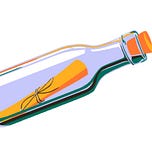We asked writer, author, and podcaster Emma Gannon to share her advice on maintaining your energy to keep writing. Emma has had an extraordinary few years, publishing four more books, continuing her acclaimed podcast Ctrl Alt Delete, and adding ever more value to her ever-growing community. Emma recently moved her newsletter, The Hyphen by Emma Gannon, to Substack, where she also shares discussion threads, book recommendations, and Q&As. Read on for her advice, or listen to her read it aloud above.
Dear writer, how do you muster the energy to keep going?
It’s a great question, and I won’t start off by blathering on about how we are all balls of energy, but I think about energy all the time. As an introvert who is prone to getting extremely zapped, I’ve always been hyperaware of my own energy levels from an early age. I get completely depleted by certain social interactions that don’t seem to drain other people as much. Small talk makes my eyeballs heavy and my soul shrink. I don’t do well staying out past midnight, and I find big group meet-ups quite overwhelming because I’m unsure where to focus or put my energy. And that was before the pandemic.
I’ve felt embarrassed about it over the years, trying to cover it up, sometimes even trying to change or pretend it’s not happening. Why can’t I stay in the pub all day? Why do I need to sit in a toilet cubicle in silence at a friend’s wedding for 20 minutes to regain some battery charge? Why do I panic when I have no exit route at social functions? It’s only until my 30s, now, that I’ve felt the inner confidence to lean into who I really am and be OK with putting boundaries around my energy. I just didn’t feel brave enough to do it in my 20s.
It’s only until my 30s, now, that I’ve felt the inner confidence to lean into who I really am and be OK with putting boundaries around my energy. I just didn’t feel brave enough to do it in my 20s.
Of course, there are nuances around introvertism and extrovertism and there is a sliding scale—we can be a mixture (an ambivert), and it’s not so clear-cut between the two. But if we take the more general definition of being an introvert: I get energy from being on my own or with a loved one, as opposed to getting energy from a more sociable situation. After big work things, networking, or events, I try to schedule in a recovery day afterwards. This is why, during my 20s, I loved living with my most extroverted friend. Doing things with her meant I could deflect some of the overwhelm. She would soak up all the energy in the room like a solar panel: she’d capture the room’s energy and convert it into electricity for the both of us. She was powering herself off of other people. I would feel my battery drain, like an iPhone bleeping dramatically that it only had 1% left.
What’s important to note here is that we all have a finite amount of energy to give each day and we are all different. I recently learned about “spoon theory,” coined by Christine Miserandino, which is popular among many people dealing with chronic illness, about how each person has a different amount of “spoons” to give the world. Author Simon Sinek uses “coins” to describe energy exchanges.
When it comes to creativity and writing, this is something that gives me energy (or spoons or coins) as opposed to draining it. My podcast, Ctrl Alt Delete, for example, is the opposite of small talk. I have long, intimate conversations with people who fascinate me, and I feel connected during and after each chat. If I spend a day writing in a café, or doing a podcast, I am topped all the way back up, like a car in a petrol station. Glug, glug, glug. But this also means I can be prone to overworking, because I just don’t know when to stop. Even if you love your work, when it seeps into escapism it just doesn’t work, because you’re suddenly out of sync with your body. When too much petrol is put in a car, it breaks, stops working, and it is very costly to repair. It’s a balancing act: of leaning into the things that give you spoons and knowing also when to rest. Actively rest.
In the past two years, I completely KO’d, like a character in a Tekken game getting slam-dunked. I had zero energy, zero creativity, and I just went for sad walks listening to audiobooks. I was meant to write and hand in a new novel to my publisher and didn’t. I didn’t have the energy. There were many projects that fell by the wayside during those two years, and that’s OK. I did what I needed to do to make money and get by, and that’s all I could muster. I am guilty of treating day-to-day life as though we are just a brain in a jar sometimes, but we have to tune in to our bodies too. Our bodies are always in the present moment even if our brain is not: if our body is saying rest, we must rest. If my fingers are itching to type, I type. I have felt lucky that I can design my own day. I work for myself and I don’t have kids. I believe that the workplace is broken because we aren’t trusted or respected as individuals enough, especially in the corporate world, to trust our own bodily rhythms. Nine to five is in many ways the worst part of the day for some people. It cuts out the boost of the early-morning rise or the late-night wonder of the night owl; we each get surges of energy in different parts of the day. When we learn to regulate our own energy in a way that serves us, we really can make magic happen.
We each get surges of energy in different parts of the day. When we learn to regulate our own energy in a way that serves us, we really can make magic happen.
Of course, there are times I go against all this to survive in this capitalist world, and my rituals and routine go out the window, but I only maintain this unblocked creative career by taking care of my energy levels, by working in a way that suits my own natural rhythms; sometimes working feverishly all night, sometimes having long breaks, and also, crucially, by saying no a lot. Preserving your energy means being unpopular sometimes. It means going against the grain. It means tapping into your truest needs. It means refusing to abandon yourself.
Yours sincerely,
Emma
This is the fifth in a recurring series of longform writer advice, following podcaster Alicia Kennedy’s advice on learning to listen, Embedded’s Kate Lindsay’s advice on creating trust with your readers, Lance’s Anna Codrea-Rado’s advice on learning to celebrate just how far you’ve come, and Mason Currey’s advice on creative growth.
Could you use some advice or inspiration from a fellow writer about creativity, motivation, and the writing life? Submit your question for consideration for a future advice column by leaving it in the comments below.




















Share this post